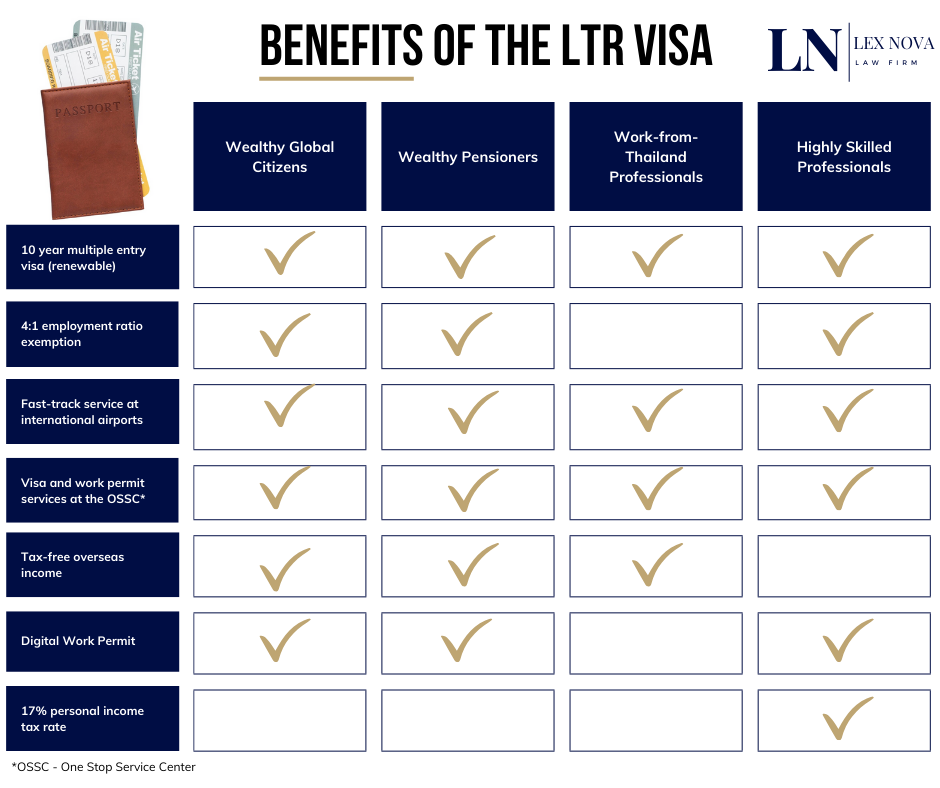Introduction:
Thailand has established itself as a leading destination for eligible foreigners seeking travel, work visa opportunities, and business ventures. To embrace this position and continue to attract high value individuals, the Long-Term Resident Visa (LTR Visa) for Highly Skilled Professionals and economic and investment stimulus measures were introduced by the Board of Investment (BOI). Through this LTR visa program, Thailand aims to attract skilled international professionals and individuals possessing expertise in specially targeted industries, with the goal of driving and developing the Thai economy.
This visa offers special benefits, including a 10-year Thailand Visa validity period, catering specifically to this demographic.
Key Points
- The LTR Visa is aimed at attracting and retaining highly skilled foreign professionals and other foreigners in specific industries identified by the Thai government, such as automotive, electronics, tourism, aviation, and digital, which are key sectors targeted with economic and investment stimulus measures.
- Eligibility requirements include a bachelor’s degree or higher, at least 5 years of work experience in a highly skilled field, an annual income of at least $80,000 for the past two years, and a job offer from a Thai company in an approved industry.
- Key benefits of the LTR Visa include a 10-year validity, ability to live and work in Thailand without yearly renewals, eligibility for a 17% flat personal income tax rate, and the ability to bring spouse and children as dependents.
- Applicants must obtain a Qualification Endorsement Letter (QEL) from the Board of Investment (BOI) as a mandatory step in the application process, which can take several months and requires extensive documentation.
What is the LTR Visa for Highly Skilled Professionals?
The LTR (Long-Term Resident) visa for highly skilled professionals is a visa category introduced to attract and retain highly skilled foreign workers in specific professions or industries where there is a talent shortage, promoting economic growth and innovation in Thailand.
What is the Difference Between the LTR for Highly Skilled Professionals and the LTR for Working from Thailand?
The LTR (Long-Term Resident) visa in Thailand offers two main categories for foreign working professionals seeking long-term residency in Thailand: the LTR for Highly Skilled Professionals and the LTR for Working from Thailand.
The main differences between both these visas lies in the purpose of the visa:
LTR for Highly Skilled Professionals
This category is designed for highly skilled foreign experts, professionals, investors, and retirees who can contribute to Thailand’s economic and social development.
LTR for Working from Thailand
This category is intended for eligible foreigners who want to work remotely for their overseas employer or operate their own business while residing in Thailand.
What are the Eligibility Requirements for the Long-Term Residency Visa for Highly Skilled Professionals?
To qualify for the LTR Visa for highly skilled professionals, applicants must satisfy the following criteria:
- have a bachelor’s degree or higher from an accredited university.
- have at least five years of work experience in a highly skilled field.
- have an annual income of at least USD 80,000 for the past two years.
- have a valid job offer from a Thai company.
- work in a specific industry as approved by the Board of Investment (BOI).
- Have valid health insurance (coverage for hospitalisation treatment of no less than 50,000 USD and the remaining period of no less than 10 months from the date application for the LTR process OR, Evidence showing valid Social Security benefits which insures hospitalisation treatment in Thailand.
Which Industries Must the Applicant of a LTR Visa for Highly Skilled Professionals Work in?
Applicants of the Long-Term Residency Visa for Highly Skilled Professionals must also work in a specific industry as approved by the Board of Investment (BOI), which is in line with Thailand’s economic and investment stimulus measures. The industries approved by the BOI are considered strategic industries that the government has identified as having the potential for rapid growth and high-value creation to drive Thailand’s economic transformation.
With this in mind, the BOI required applicants with have obtained specialised skills in the following 15 highly skilled professional fields in order to be eligible to apply for the LTR based on being a highly skilled professional:
- High-generation Automotive Industry
- Smart Electronics Industry
- Affluent Tourism Industry
- Aviation Industry
- Biofuels and Biochemicals industry
- Digital Industry
- Agricultural and Biotechnology Industry
- Transportation and Logistics Industry
- Automation and Robotics Industry
- Medical Industry
- Defense Industry
- Petrochemical and chemical industry
- Industrial Business Center (IBC)
- Industries that directly support the circular economy, such as waste fuel production and water resource management
- Other industries requiring specialised skills in a particular area, such as:
- Researchers in target industries or technologies
- Experts in artificial intelligence (AI), digital systems, finance, environment and energy, start-up incubation projects, and trade and investment promotion organisations from abroad
- Human Resource Development/Research and Development for targeted industries.
What are the Benefits of the Long-Term Residency Visa for Highly Skilled Professionals?
The Long-Term Resident Visa category for highly skilled professionals offers many advantages to help facilitate living and working in Thailand. Examples include:
- A 10 year visa that offers the holder the ability to live and work in Thailand without having to renew their visa every year.
- Highly skilled professionals can apply for a fixed rate of 17% for personal income tax.
- Eligibility to apply for immigration and work permit services at One Stop Service Center for visa and work permit. The One Stop Service Center is a fast and efficient service that will allow holders of LTR visas to save a significant amount of time for immigration and work permit matters when compared to normal visa holders in Thailand.
- The ability to apply for a Digital Work Permit.
- The ability to bring your spouse and children on dependent visas.
- The ability to start your own business.
Please note that holders of the LTR for Highly Skilled Professionals ARE NOT eligible for the Tax exemption for overseas income.

What Documents are Required when Applying for LTR Based on Being a Highly Skilled Professional?
When applying for an LTR visa based on being a Highly Skilled Professional, applicants must be able to provide the following documentation.
Evidence of Income and/or Investment
Applicants must be able to provide evidence that they have earned USD 80,000/ a year for 2 consecutive years. It is important to note that the financial obligations can be satisfied using both active and passive income.
Examples of accepted forms of evidence include:
- Personal income tax returns,
- Bank statements obtained from your bank
- Pay slips from your employer
- Documents showing income earned from passive income such as interests, dividends, royalties or rental income etc.
Education Certificate
The LTR Visa for Highly Skilled Professionals is dependent on the applicant having the required education and experience levels, therefore this section is particularly important. Applicants must be able to provide the following documents:
- Master Degree from a field that appears on the BOIs list of target industries. In the event that the education certificate is not from a field that is on the list of LTR target industries the applicant will need to have or obtain a training certificate that shows they are in possession of the skills relevant to targeted industions.
- The education certificate must be translated in either Thai or English and legalised by the Embassy or Government of the applicant
Employment Certificate
Applicants must be able to provide an employee certificate from their current employer. This certificate must state that their qualifications and skills are relevant to the LTRs targeted
industries and the applicant has at least 5 years of valid experience.
Work Experience Certificate
A work experience certificate will be required from the applicant’s previous employer(s).
Work experience certificates are required from the past 10 years to the present.
Employment Contract
A current employment contract with the employer that has been signed by the applicant and the authoriser. This contract must state:
- the start and end date of the contract,
- salary,
- position and
- job description.
Company Documents
The following documents are required from the Company who employs the applicants:
- company affidavit,
- business licence(s),
- shareholders list,
- The audited financial statements of the company for the latest financial year,
- company profile and brochure.
What is the Application Process for the LTR Visa for Highly Skilled Professionals?
The first step for applying for the LTR for highly skilled professionals, the first step is to obtain a Qualification Endorsement Letter (QEL) from the Board of Investment (BOI). The QEL is a mandatory document for the LTR visa application process, as it serves as a formal endorsement of eligibility for the LTR visa program under this category.
To obtain a QEL, applicants must submit an application form and supporting documentation, including their resume, diploma, and employment certificate(s). Once the QEL is granted, it remains valid for 60 days from the date of issuance.
With a valid QEL, applicants can apply for the LTR Visa at a Thai embassy or consulate overseas, or at an immigration office in Thailand. It is advisable to start the application process early, as it can take several months to complete. Ensuring that all required documentation is prepared in advance will help expedite the process. Applicants should also be prepared to answer questions about their work experience and skills, as the BOI may request additional information during the application process.
Once a QEL has been obtained, the application process is as follows:
Application Submission
Applicants are required to register and submit online an application for the qualification endorsement. This will require the applicant to upload all required supporting documents.
Qualifications Endorsement
After the BOI has received all the required documents, the application will be registered and sent for the qualifications endorsement by the relevant government agencies (such as Immigration, Thailand’s Board of Investment, Department of Consular Affairs, etc.).
Applicants will be notified of the result for the qualifications endorsement within 20 working days. Please note that the processing time may take longer if additional documents are required by any of the reviewing agencies.
Please also note that any decision made by the government agency regarding the LTR Visa qualification endorsement result is considered final and binding.
Visa Issuance
Once the application and qualification endorsement has been approved, applicants will be required to submit additional information and documents for the pre-approval process, which takes 1-3 working days (processing time might take longer if additional documents are requested).
This letter can be used to apply for the LTR Visa issuance at the Royal Thai Embassies/the Royal Thai Consulate Generals overseas or One Stop Service for Visa and Work Permit Center (Bangkok). Applications must be made within 60 days from the issuance date of the letter.
Work Permit Issuance
Please note, Work permits are not required for Work-From-Thailand Professionals holders.
In order to ensure the application process is as smooth and efficient as possible our immigration experts suggest the following tips:
- Start the application process early. Applying for an LTR is a time consuming process and the application process can take several months. It is important to start the process early to avoid any delays.
- Make sure that you have prepared all of the required documentation and ensure it contains the correct information. In practice, errors in the paperwork and not providing the correct info is the leading cause of delays to the process.
- Be prepared to answer questions about your work experience and skills. The BOI will often ask follow-up questions or for more information from you as part of the application process.
- Be patient.
Can Holders of the LTR for Highly Skilled Professionals Bring Their Family as Dependents?
Applicants of the LTR for Highly Skilled Professionals are also permitted to bring up to 4 family members to Thailand as a dependent of their LTR Visa.
Permitted family members include children under the age of 20 and spouses. Such dependents must be legal family members through marriage, birth, or adoption. Please note, that currently, common law and same-sex marriages are not recognized and therefore unfortunately, spouses in such relationships are not eligible as dependents.
In order for the dependents to be able to join the holder of the LTR visa, the following must be satisfied:
- Each dependent must have health Insurance with a coverage of at least $25,000.
- Only children under 20 are only considered as dependents.
- The main applicant will also have to provide additional documents as proof of their dependent’s relationship to them (e.g. marriage or birth certificate).
Our Thoughts
The Long Term Residency Visa for Highly Skilled Professionals offers several benefits to foreigners, including living and working in Thailand with a 10 year visa, tax incentives and access to a Digital Work Permit. The LTR removes many barriers, which can often be problematic for many people and makes living and working much more comfortable for the holders of the LTR.
Please note that the Long-Term Resident (LTR) application is time-consuming and requires numerous documents/information from the BOI. There will often be times when applicants receive contradictory feedback from the Board of Investment (BOI) officers. Our experts have accumulated a lot of experience when applying for an LTR visa and are available to assist you with your application to help make the process as smooth as possible.



